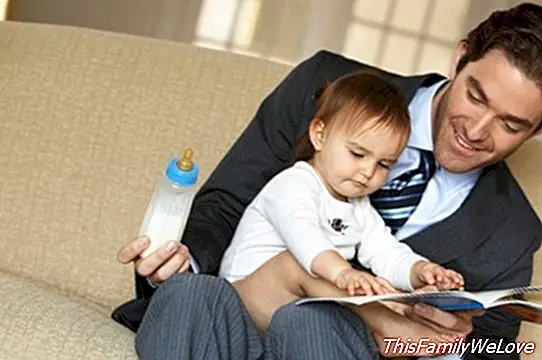Paternity leave generates fear in 30% of parents

Paternity has evolved in recent years, involving new figures in the care of the baby. The role of the father has grown, however, the paternity leave still generates fear of employment discrimination in 30 percent of parents, according to the study The evolution of motherhood in Spain in the last 30 years, conducted by the consultancy Conecta and Philip Avent.
The role of the father in current families
The role of the father has increased with the normalization of certain aspects such as, for example, paternity leave. 30 years ago, practically no man, although he had been given all the facilities, would have requested this permission. In a certain way, the normalization of this parental leave is due to the fact that, to this day, there is a certain agreement among the parents who understand that it does not have to be the mother who sacrifices her profession.
However, currently, 30 percent of parents consider that men who enjoy paternity leave can be marginalized in their jobs, and in practice there are not many parents who request it when they have a child.
The feeling of being parents
The father and the mother face the birth of a child differently. In fact, the feeling of being mothers and fathers manifests itself in different moments of pregnancy for some and others. While many mothers (40%) feel that sensation when they learn that they are going to be mothers, 36 percent of the parents do it when the child is born and they see him for the first time. However, although the way to face the birth of a child is different for fathers and mothers, the role of one and another after childbirth has been distributed in recent years between the two figures.
The division of tasks at home
The mother is still the main figure for baby care. Thus, tasks such as nutrition, general care, education, medical check-ups and diapering are functions that the mother continues to perform. However, currently has more allies than mothers 30 years ago.
In recent years, the father figure It has become relevant, although it remains in the background with respect to the mother. Now they play an important role in terms of cleaning work: 27 percent of parents say they always take care of the moment of the bath and 18 percent of the change of diapers. Thus, although parents recognize that mothers are still the main figure involved in the care of the baby, they consider that they perform more tasks than mothers attribute to them.
In addition to the cleaning tasks, the activities in which, according to the parents, most participate are: to play (99%), go out to take a walk with the child or take him to the park (92%). However, regarding the feeding of their children, parents consider that their role is much greater than that indicated by mothers. The same happens at the time of wear to children: 81 percent of parents say they always take charge, or at least, on a regular basis, against the opinion of mothers (54%).
The role of grandparents
Grandparents continue to occupy the position of first support requested by the parents to attend to the children when they can not do so. Although little by little there are more couples who do not have any support person to care for their children (23%), there are still many mothers (64%) who turn to grandparents when they need help with the little ones.
Just like grandparents are the support figure par excellence, The pediatric It is still a reference that has gained special relevance in recent years. Currently, 80 percent of mothers turn to the pediatrician, much more than the mothers of 30 years ago (2%), to consult problems such as fever or any other symptom that they prefer not to pass without consulting a professional.
A new ally, technology
The Internet, although it is not the main source of information, has become a habitual tool for consultation (57% affirm that although it is not their source of information, they usually consult it regularly) for mothers they did not have access to 30 years ago. 60 percent of mothers say they use the Internet as a way to share tips and experiences, in addition to using it to find items or toys for the baby. However, it is not a means used to consult about health problems, for which the mother, as previously mentioned, usually consults the pediatrician.
In addition, there are instruments that technology has given us and that make life much easier for today's mothers, such as babies (91%), breast pump (87%) or sterilizers (83%), which now mothers use on a regular basis.
Breastfeeding and the bottle
Another aspect that has also changed is the mothers' vision of breastfeeding and bottle feeding.According to the study, current mothers continue to recognize the importance of breastfeeding. More than half of Spanish mothers (60%) consider it fundamental for the development of the baby and 85 percent of them have chosen breastfeeding as their first option. However, it is not always easy to maintain as long as they consider advisable. Currently, the average breastfeeding period is about 12 months, while the ideal for most mothers (70%) would be able to breastfeed until 18 months.
From this difficulty of extending the period of breastfeeding to what is desirable, an ally emerges for mothers: the Babby bottle. The majority of mothers (73%) consider that the bottle is the best choiceto feed the baby, and the only one when they must return to work (62%). In addition, it is a function that can also play the father, and in which the majority of mothers (73%), try to make him a participant, although in practice few parents do.
Patricia Núñez de Arenas




